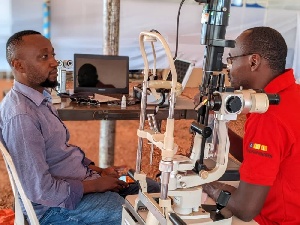- Home - News
- Elections 2024
- News Archive
- Crime & Punishment
- Politics
- Regional
- Editorial
- Health
- Ghanaians Abroad
- Tabloid
- Africa
- Religion
- Photo Archives
- Press Release
General News of Thursday, 8 May 2025
Source: www.ghanawebbers.com
EPA Director admits some forest mining guidelines lacked legal backing
Michael Sandow Ali, the Director of the Mining Department at the EPA, spoke about mining regulations in Ghana. He stated that some guidelines for mining in forest reserves are not legally binding. These guidelines were created to address urgent national issues.
Mr. Ali shared his thoughts during the JoyNews National Dialogue on May 8. He noted that parts of Ghana's mining framework are often misunderstood due to a lack of public education.
“This law has been misconstrued,” he said. “We didn’t do enough education on it.” He mentioned that A Rocha raised valid points but emphasized that this law was developed after two decades of observing mining in forests.
He traced the issue back to the 1990s when around 30 companies received exploration permits from the Forestry Commission. A moratorium followed, but many companies had already invested millions.
“In 1997, they reopened opportunities for these companies,” he recalled. “Out of 30, 17 could explore again. Five found commercially viable gold deposits.”
In 2001, President Agyekum Kufuor faced a dilemma as some companies had invested up to $18 million each. To avoid paying judgment debts, a Cabinet Committee recommended allowing these five companies to mine legally.
To ensure responsible operations, the EPA created regulatory guidelines based on practices from Australia, South Africa, and Brazil. However, Mr. Ali admitted not all provisions had legal backing.
“We prepared guidelines for these five companies,” he explained. “They followed them well, but some aspects were not legally enforceable.”
After two decades of using these guidelines, the EPA decided a Legislative Instrument (L.I.) was needed for legal authority and future clarity.
“The regulation was removed after our review,” he said. “We concluded an L.I. was necessary because someone could argue it was just a guideline.”
Mr. Ali’s comments provide important context for the ongoing debate about L.I. 2462 in Ghana's environmental and mining policies. They highlight the need for clarity and legal enforcement in these areas.











